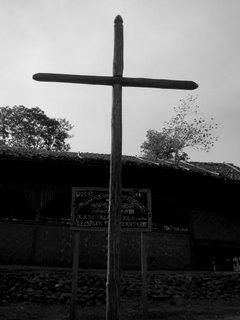THEY CALL US ILLEGAL

The Thai Constitution of 1997, also called the People’s Charter, has been hailed for its inclusion of numerous rights and benefits, including 12 years of compulsory and free education, public health services, as well as freedom of speech, association and movement. From 1992 to 2003, Thailand acceded to no less than six major human rights treaties. In the past few years, however, some human rights groups and others within and outside Thailand have been asking if the Thai welcome to refugees, migrants, and asylum seekers has cooled, indeed, if the overall human rights climate in Thailand is growing colder. As evidence, they point to crackdowns on illegal migrants, a “war on drugs” in 2003 that left more than 2,000 people dead in three months, and the fact that Thailand has no legal working definition of “refugee” on the books.
Despite a long history of involvement with refugees and asylum seekers and a cooperative relationship with the UN High Commissioner for Refugees dating back to at least 1975 with the first influx of Indochinese refugees, Thailand has never ratified any of the UN instruments relating to the status of refugees or stateless persons.
The more than 140,000 Myanmar nationals living in camps along the Thai-Myanmar order, though classified as “displaced persons” by Thai authorities, are recognized by UNHCR as refugees.
Elwyn woke me. He came in to sit on my floor and talk. He has many ideas and a mouth full of words. He gave me information about Thai soldiers in and around the Mae La camp, about them arresting freedoms, torturing workers who venture past the walls, even raping women.
“I have no chance to be a man, earn some baht here, no” he says.
“I would like to buy some small thing, plant rice and get more education. We have no chance for more study.”He went on speaking in memories as pictures of a sweet country land and handed-down tales of his glorious nation collided violently with the admissions of the fractured, ignoble pains of a refugee.
“They Thai solider call me illegal, immigrant. They call us displaced person and so many other bad names. I don’t want to hear it anymore. I am a man, just like you. It is not good for our hearts, these dirty things they call us, no.” I had nothing to say so I only listened, still half asleep in the hot room. I sat on the floor and listened to a pattern already familiar in speaking with Karen students here. Some of these younger ones, when given time to speak spin tales that rise up from anger, hate, bitterness and shame to intense emotions of pride and courage, nail-tough strength and intelligence.
“If we die, it’s ok,” Elwyn says plainly. I keep staring up at the wooden roof through my net, my shirt soaked in sweat.
“Better like that, maybe. But to stop struggle, that is bad, not like Karen, not like a man. We must fight to the end or die. This is simple and truth.”
*Note, Myanmar is the name recognized by the UN, but not by the US nor the Karen people who like most of the world view the name change from Burma another of the ruling military junta's slight of hand manouevers to put a 'new face' on the country as they continue to stall the peace process towards democracy.


